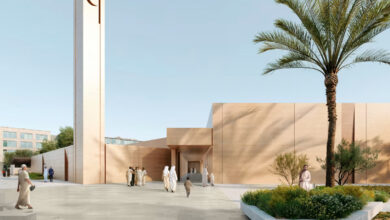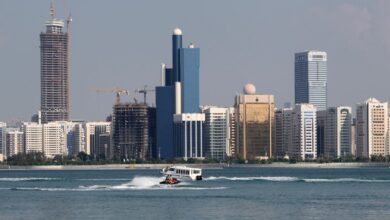ABU DHABI – Five pro-democracy activists on trial in the United Arab Emirates returned to court Monday, two days after the oil-rich Gulf nation held elections for an advisory council.
While the United Arab Emirates has not seen street protests like those that have roiled other Arab nations, including nearby Bahrain, authorities have moved aggressively to silence pro-reform advocates and to keep demands for political change, inspired by Arab Spring uprisings in the rest of the Middle East, out of the Gulf federation.
The activists, including a blogger and a prominent academic, were detained in April after they signed an online petition demanding constitutional changes and free elections. They were accused of anti-state crimes and were charged in July with insulting the country's rulers and using an online forum to conspire against the state.
Among the five defendants, all of whom have pleaded not guilty, are prominent blogger Ahmed Mansour and economics professor Nasser bin Ghaith, who frequently lectured at the Abu Dhabi branch of Paris' Sorbonne University.
The five activists attended Monday's closed-door proceedings in Abu Dhabi's Federal Supreme Court amid tight security. Police vehicles surrounded the court building and armed policemen were patrolling the hallway of the court that normally tries terrorism and other anti-state crime suspects.
A group of government supporters staged a rally in a park across from the court, denouncing the activists as traitors and ungrateful citizens for cradle-to-grave privileges awarded to them by the ruling sheiks.
"We live in the state-of-the-art country that others can only dream of and they spread lies that we don't get rights," said Ahmed Jumaa, a 42-year-old businessman from the capital, Abu Dhabi. "We get free education, a house and medicine, we even get money to get married. And they insult our leaders and our society? What more do they want?"
Shortly before the hearing started on Monday morning, security personnel asked reporters to leave the building, and representatives of international rights groups, such as Human Rights Watch and Amnesty International, were not allowed to observe court proceedings.
"People lose faith in justice when trials are conducted in secret," said Samer Muscati, a Middle East researcher for the New York-based Human Rights Watch. Muscati said rights groups are concerned because the defendants have been held for five months without bail and have no right to appeal the court's verdict.
Muscati urged the UAE to release the activists because the government has presented "no legitimate evidence" to support charges against them.
It was unclear when the three-judge panel will issue the verdict in the case.
A court official said prosecution called witnesses during Monday's proceedings, but did not elaborate. The officials spoke on condition of anonymity because of the sensitivity of the issue.
Political activity is severely restricted in the UAE, an alliance of seven semiautonomous states, each ruled by a hereditary sheik. There are no official opposition groups in the country and political parties are banned.
In an unprecedented move for the politically quiescent country, 130 people in March signed a petition demanding constitutional and parliamentary changes, free elections and a more equitable distribution of the country's oil wealth.
The five activists in custody were among the signatories of the petition.
On Saturday voters selected by the UAE rulers elected a federal advisory council. The rulers called the balloting — only the second in the country's 30-year history — a "proud day" in the efforts to expand the public role in policy making.
The council has no direct powers and the voters are hand-picked according to tribal and regional ties by rulers of the seven semiautonomous city states.
The electoral pool has been significantly expanded since the 2006 elections and now includes more than 129,000 voters. While they are a fraction of the nearly 2 million Emiratis, the decision was seen as a concession by the rulers, feeling the heat from demands for reforms and change around the region.
Only a fraction of hand-picked voters showed up at the polls Saturday. The UAE official news agency said 36,277 of the 129,000 selected voters cast their ballots for the 40-seat council.
"The participation was good, though we hoped for a broader one," Anwar Gargash, the UAE minister of state and the chairman of the National Election Committee told WAM. He said "factors behind the low voter turnout" will be analyzed.




